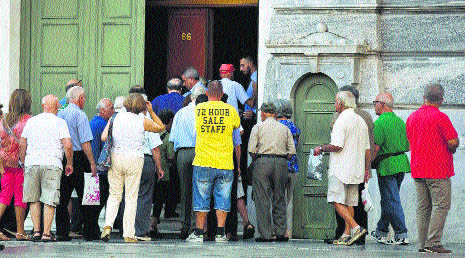
Banks lost billions of euros after panic-stricken Greeks began to withdraw funds.
Arun Kumar
GREECE is in turmoil is an understatement. The passage of the new austerity programme in Greek parliament was a surprise, given the split in Syriza, Mr Tsipras' left-wing party. Various explanations have been advanced but these are not convincing. One needs to understand the functioning of the world of finance.
In Europe, finance is led by the troika — Germany, European Central Bank (ECB) and the European Commission - which forced Mr Tsipras to sign on the dotted line. The IMF is in the background but is arguing for a partial debt write-off, saying if the troika-foisted austerity programme has not helped Greece pay back its debt in the last five years, how would more austerity enable the repayment of an even bigger loan.
Politically, Greece is divided. To a majority of voters, the dignity of Greece was paramount and they voted ‘no’. But parliament accepted what the majority rejected so as to stay in the eurozone. They accepted the argument that the rejection of the package would lead to chaos and economic collapse.
If this was clear, why did Mr Tsipras initially not accept the austerity programme and then took a week to capitulate? Why did he raise the expectations of the Greek people that he has something up his sleeve?
Did Mr Tsipras miscalculate? Did he perhaps think that the troika would back down and allow the Greeks to have their way? He perhaps believed that Germany would not wish to be seen to be responsible for the start of the dismantling of the European project. He perhaps thought that they could not ignore Greek public opinion, no matter what their economic logic. But when has finance cared for public opinion?
In the case of the developing world, country after country has gone to the IMF for loans since the early 1980s and had to fulfil stringent conditionalities leading to austerity. For Africa, the decade of the 1980s was called the lost decade. Could Greece, as a developed country, escape such a denouement? Clearly not, as Greece has realised since 2010.
Greece is in deep depression since 2008, with the GDP declining by 25 per cent. It has a debt of 170 per cent of GDP, because of which it has a low credit rating leading to a high interest burden it is unable to pay. Unemployment is running at 25 per cent and among the youth it is around 60 per cent. Its banks have almost run out of money. The ECB will give them further funds only if the new agreement is implemented. Greek banks were closed for about two weeks and opened after fresh liquidity came from the ECB.
In mid-June, the banks were losing billions of euros because panic-stricken Greeks were withdrawing funds. The run on the banks tells the story of what happens in panic situations. Financial problems of the economy increase because of loss of confidence among the public.
Usually people hold only a small part of their savings in cash (or liquid form) for transactions. Most of the savings are in other assets and especially financial instruments, like savings accounts, fixed deposits, shares, debentures and so on. So, in normal circumstances, a country needs only a small part of its annual income in the form of cash — money goes around from one transaction to another and circulates. However, when the confidence in the economy is shattered, people like to hold cash to take care of eventualities. Like it happened in Greece.
When the banks were closed, the Greeks could withdraw 60 euros a day. Where was this money going? It could go abroad or be held as cash. Since the banks were not open, it could not go abroad, so it must have been in the country and held for ‘precautionary’ purposes. The ‘velocity of circulation’ of money just dropped, that is, circulation of money slowed down and for a given amount of transactions, more cash was needed than earlier. In normal times, money would have gone around faster and there would have been no shortage of cash in the economy.
Mr Tsipras was in a no-win situation once the political battle was lost in the negotiations. The Germans acted tough and were ready to let Greece exit the eurozone even if for five years. They realised that the Greek economy would collapse if Greek banks did not get liquidity and that Mr Tsipras had no alternative plan. Introduction of the drachma (the older currency) was not immediately feasible since no preparation for it was made.
Today, the world of finance dominates world markets and dictates policies, even in the US. This is due to the high degree of mobility of global capital. It can intimidate nations (like Greece) by threatening to leave. Direct tax rates have come down because countries have lowered taxes to attract capital. This results in cuts in expenditures to keep the budget deficit in check. The IMF and the credit rating agencies watch the budgetary deficit of a country to determine their credit worthiness. If that deteriorates, they are in deeper trouble.
There is a vicious cycle of cutting expenditures (austerity) to keep deficit in check, which slows down the economy, resulting in less tax collection and a rise in the deficit, which to stem would mean cutting expenditures further. Such a policy is disastrous when there is already a demand shortage. Countries are forced to follow conservative ‘supply side’ policies to stimulate the private sector to invest, but in an open economy, this is not guaranteed.
The world of finance reduces a nation's policy space to follow independent economic policies suited to national requirements. Some nations facing a crisis have succeeded in the past by stopping capital movements - like Malaysia, when it faced the contagion in 1997, and Argentina and Iceland in the previous decade. These economies succeeded because they had their own currencies and did not face the problem of lack of liquidity. Greece as a part of the eurozone cannot print currency and had not worked out an alternative. The lesson is that alternatives have to be worked out, these do not just happen.
The situation in Greece is being watched globally. Successful Greek resistance would have strengthened those who have wanted to chart a path different from the one imposed on them by the Wall Street or the ‘1 per cent’. But this was not to be. The lesson is Mr Tsipras played poker with a poor hand and his bluff was called.
— The writer is a retired professor, Centre for Economic Studies and Planning, School of Social Sciences, JNU



























